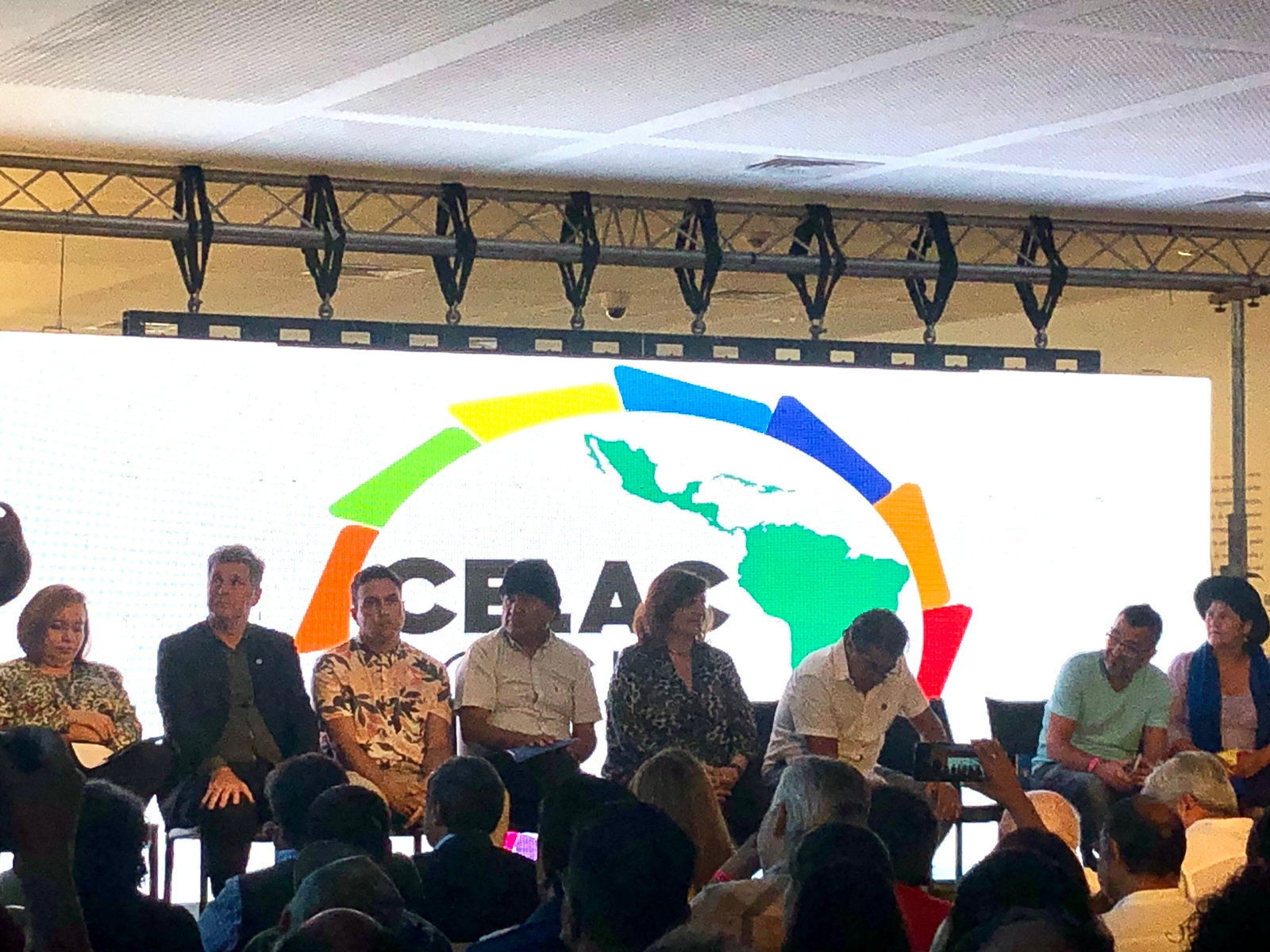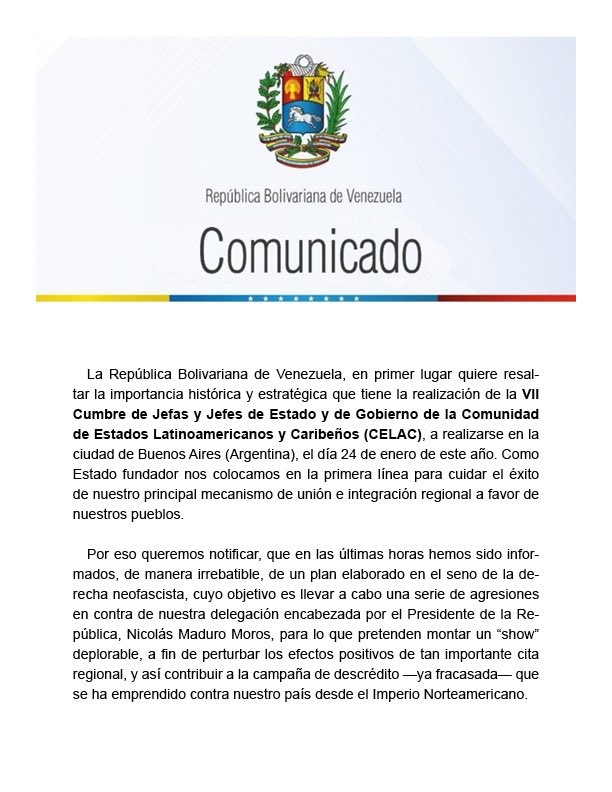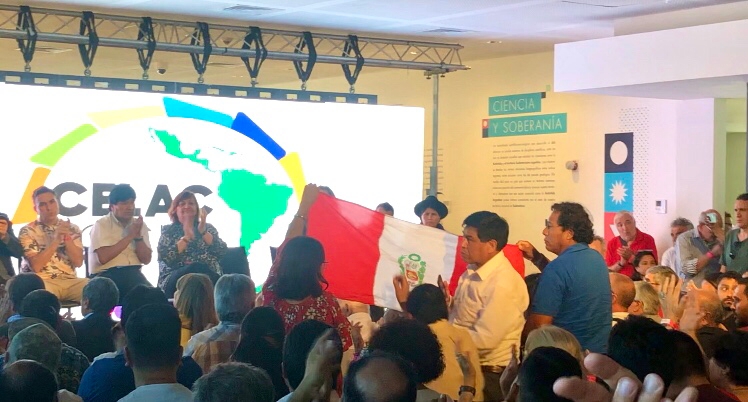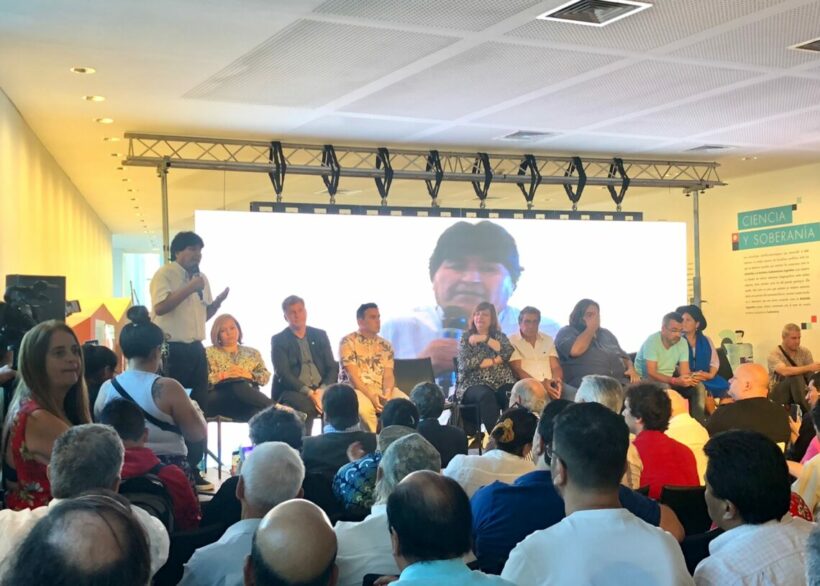The first meeting of Celac Social was held under the slogan: “Latin American and Caribbean integration to stop the new Condor plan in the region”. This is a space that brings together social, political, trade union, indigenous and human rights organisations in the framework of the 7th Summit of the Community of Latin American and Caribbean States (CELAC) that takes place on Tuesday 24 January in Buenos Aires.
By Ursula Asta and Leila Bitar for Radio Gráfica
The launch, held on the afternoon of Monday 23rd at the Malvinas Museum, located in the former Esma Memory Space, was born with the conviction of forming a permanent and institutional instance of regional integration of peoples and with the aim of advancing towards the creation of spaces for dialogue between social organisations and governments.
 Launching of the Social Celac / Radio Gráfica
Launching of the Social Celac / Radio Gráfica
The place of its presentation becomes symbolic in the sense of the Argentine claim on the legitimate sovereign rights over the Malvinas Islands, South Georgia, South Sandwich Islands and the surrounding maritime areas and the Argentine Antarctic Sector. Something that, as the Celac Social declaration says, was also established by Celac in the Special Declaration of September 2021. “We will return to Malvinas hand in hand with Latin America”, he pronounced loudly to applause during the inauguration of this space.
In the morning, at a press conference at the headquarters of the CTA Autónoma trade union centre, leaders from Brazil, Peru, Uruguay, Bolivia and Venezuela, among other countries, had announced the start of the activities of the Celac Social and expressed the need to coordinate the demands and claims of the peoples of Our America, in a context of the redeployment of US interests in the region and attempts at destabilisation.
Former Bolivian President Evo Morales Ayma argued that progressive and anti-imperialist governments have the duty to protect strategic natural resources, distribute wealth in order to confront growing inequality and advance a common currency project for Latin America and the Caribbean. At the same time, he repudiated the actions of the OAS as a tool for interference and destabilisation, and rejected the US economic blockade against the peoples of Cuba, Nicaragua and Venezuela.
“When I became president I had problems with some sectors of the workers who called themselves ‘apolitical’,” the leader recalled. “Imperialism, capitalism, does not want humble people, workers, peasants and indigenous people to do politics. But we decided to do politics. Trade union independence, ideological pluralism, are a doctrine of imperialism”, he explained.
At the same time, he called for unity: “We have the obligation to organise ourselves, strengthen our social forces and permanently call ourselves together to coordinate concrete actions, defend democracy and fundamentally defend our governments, some are progressive, others socialist, others humanist, but we have to defend the presidents of the anti-imperialist governments of Latin America”.
 Launching of the Celac Social / Radio Gráfica
Launching of the Celac Social / Radio Gráfica
Representing Venezuela during the press conference, the parliamentarian Blanca Eekhout spoke: “We are the ones who can build a different world because we have lived through the barbarism of capitalism, of modernity, of its civilising scheme, we have the original people who understood that the earth is our mother and that we owe it to her. Today, this worldview of our native peoples is the hope for humanity.
And she remarked: “We have the obligation to build a different world. The blockade, the aggression, the demonisation and the attempt to divide us, is precisely so that this hope does not run through humanity, but it is impossible because America is one, we are destined to re-found it, to make it a nation of free, sovereign and independent republics”.
The Venezuelan Foreign Minister Iván Gil was present at the Celac Social plenary, and it was finally confirmed that he will be the person representing his country at the Summit of Presidents due to the fact that Nicolás Maduro will not be travelling to Argentina. The permanent attacks by reactionary political sectors and the addicted press achieved their goal.
While the Celac “of the peoples” was taking place, a letter from the Bolivarian government was released in which it states that the president will not travel because there are manoeuvres whose “objective is to carry out a series of aggressions against our delegation headed by the President of the Republic, Nicolás Maduro Moros, for which they intend to mount a deplorable “show” in order to disrupt the positive effects of such an important international meeting”.
The Venezuelan Foreign Minister then said: “It is up to us revolutionary militants to remove it, put it and fight” and that “this is not a struggle to support the weakest or whoever is suffering at a given moment, this is a struggle of involvement, it is the strict exercise of the word solidarity, which is to see myself represented and projected in what is happening in each of our neighbours”.
He also added that “all our brothers in Latin America and the Caribbean have the support of a government that is not just another government, that of Venezuela is a revolutionary government involved with our people, that assumes itself to be part of the social struggles, that comes from the social struggles and that sees no alternative other than social mobilisation that will precipitate us towards the definitive liberation of our peoples”.

Among the Brazilian delegations, with the Central Única de Trabajadores (CUT) and social movements, one of the voices that took the floor was that of Monica Valente, national executive of the Sao Paulo Forum and member of the Workers’ Party (PT). “We are witnessing the growth of the extreme right that insists on taking our streets, the streets of the popular movements. There are mechanisms of lawfare, fakenews and many other new and complex challenges that seek to halt the advances of our struggle”, she warned.
Undoubtedly, the participation of the new Brazilian president is one of the most important in the framework of the Celac Summit of Presidents, both because Luiz Inácio Lula da Silva is once again taking part in this regional community, and because of the agenda that the president of the Federative Republic has with the Argentine Alberto Fernández. On Monday, while the Celac Social was taking place simultaneously, the two men met amid announcements of the creation of a common currency and signed agreements for mutual cooperation in various areas.
Da Silva also took part in the opening of a business meeting, together with ministers and heads of industry confederations from both countries, at the Bicentennial Museum. Afterwards, both presidents attended the inauguration of the photographic exhibition “Pueblos Originarios – Guerreros del Tiempo” (Native Peoples – Warriors of Time) and watched together the Argentine-Brazilian Brotherhood Concert at the Kirchner Cultural Centre (CCK).
Meanwhile, the Celac Social hosted a very large Peruvian delegation, which denounced the repression of the de facto government of Dina Boluarte, which has already left more than fifty people dead. Pedro Castillo’s lawyer, Sandro Balvin, demanded the release of the detained president and remarked that it is the will of the Peruvian people that a constituent process be set in motion to replace the current neoliberal constitution with another constitution that recognises the rights of the most neglected sectors. “As of December 7, the Peruvian people have risen up in accordance with article 46 of the Constitution, no one owes obedience to an illegitimate and usurper government,” he said.
 Celac Social press conference /Radio Gráfica
Celac Social press conference /Radio Gráfica
 The Peruvian flag is raised during the launching of the Celac Social / Radio Gráfica
The Peruvian flag is raised during the launching of the Celac Social / Radio Gráfica
For Argentina, political and human rights organisations and all the trade union centres were present, including the CTA Autónoma, the CTA de los Trabajadores and the CGT, who took the floor during the plenary meeting at the Malvinas Museum. There, from 2 p.m. until after 6 p.m., different delegations added their words, arguing the importance of requesting Celac to set up a permanent instance of the Social Celac as a daily exercise, while at the same time demanding income distribution and self-determination of the peoples.
On Tuesday 24 January, at the same time as the Summit of Heads of State, the last activity of Celac Social will take place on the occasion of this 7th presidential conclave, with a conference at the CTA headquarters at 10:30 am, where the conclusions of the meeting of organisations will be shared, a mobilisation called at 12 noon at Cerrito and Santa Fe Avenue will march to the Sheraton Hotel with the aim of symbolising and making concrete the delivery of the Declaration drafted by the organisations to the leaders.
The challenge of nurturing and shaping a space for debate and permanent integration of the free organisations of the people of Latin America and the Caribbean begins today, with previous paths travelled, like that huge congregation that said No to the FTAA in Mar del Plata, like the Sao Pablo Forum, like the beginnings of the Runasur. A necessary meeting of the peoples, which will have to take on a leading role in order to affirm its course from now on.










